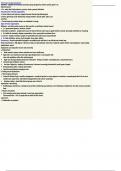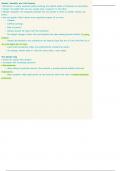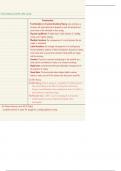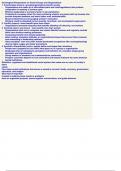Faithmckenzie
On this page, you find all documents, package deals, and flashcards offered by seller faithmckenzie.
- 15
- 0
- 1
Community
- Followers
- Following
16 items

Formal Organization
A formal organization refers to a structured and deliberately created social entity with defined goals, roles, and rules. It is characterized by a hierarchical structure, division of labor, and specific procedures and protocols for decision-making and coordination. Formal organizations can take various forms, such as businesses, government agencies, educational institutions, and nonprofit organizations. Here are some key features and aspects of formal organizations:
- Class notes
- • 1 pages •
A formal organization refers to a structured and deliberately created social entity with defined goals, roles, and rules. It is characterized by a hierarchical structure, division of labor, and specific procedures and protocols for decision-making and coordination. Formal organizations can take various forms, such as businesses, government agencies, educational institutions, and nonprofit organizations. Here are some key features and aspects of formal organizations:

Gender, Sexuality, and Life Chances
Gender, sexuality, and life chances are interconnected aspects of social life that significantly influence individuals' opportunities and experiences within society. Here's an overview of how gender, sexuality, and life chances intersect:
- Class notes
- • 1 pages •
Gender, sexuality, and life chances are interconnected aspects of social life that significantly influence individuals' opportunities and experiences within society. Here's an overview of how gender, sexuality, and life chances intersect:

Functionalisim
Functionalism is a sociological perspective that examines society as a system composed of interconnected parts that work together to maintain social order and stability.
- Class notes
- • 1 pages •
Functionalism is a sociological perspective that examines society as a system composed of interconnected parts that work together to maintain social order and stability.

Sociological perspectives on Social Groups and Organizations
Sociology offers various perspectives on social groups and organizations, providing insights into their formation, dynamics, and impacts on individuals and society as a whole. Here are some key sociological perspectives relevant to the study of social groups and organizations:
- Class notes
- • 1 pages •
Sociology offers various perspectives on social groups and organizations, providing insights into their formation, dynamics, and impacts on individuals and society as a whole. Here are some key sociological perspectives relevant to the study of social groups and organizations:

Symbolic Interaction theory
Symbolic interaction theory analyzes society by addressing the subjective meanings that people impose on objects, events, and behaviors.
- Class notes
- • 1 pages •
Symbolic interaction theory analyzes society by addressing the subjective meanings that people impose on objects, events, and behaviors.

Sociological Theories of Self Development
Sociological theories of self-development examine how individuals form their identities and understand themselves within the broader social context. In this document we learn about The Wiley family and what Kohlberg's Theory of Moral Development
- Class notes
- • 1 pages •
Sociological theories of self-development examine how individuals form their identities and understand themselves within the broader social context. In this document we learn about The Wiley family and what Kohlberg's Theory of Moral Development
